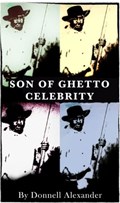"I got paid for being dope," brags Alexander, a veteran hip-hop journalist who was tapped by ESPN: The Magazine to provide street cred in its coverage of African-American athletes, only to find his prose chipped at by uncomprehending white editors. He counts among his talents "consuming the stranger dimensions of popular culture and then talking about it" and "[getting] tore-down drunk and [writing] about the emotions I experienced at their most raw." Both are on display in this dizzying memoir, which shifts seamlessly from one literary style to the next, even turning briefly into a graphic novel in a scene depicting Alexander's first breakdancing lesson and subsequent concussion. From a whirlwind tour of Alexander's escape from Sandusky, Ohio, to start a career as a reporter, and of bouts of sex and drug use that repeatedly bring him to the brink of mental collapse, his father, Delbert, flits through the narrative. Although Alexander's mother called her son's wild temper "the Delbert in him," the memoir eventually identifies that quality as his unrelenting desire to reinvent himself, to hustle the system even when he hurts those closest to him and grinds himself down in the process. Few writers would possess the willingness to confront their disintegrating marriage with the brutal honesty shown here; fewer still would admit so readily to their own culpability. Alexander has given his inner demons a powerful voice, only to shout them down and prove himself at the top of his game.
© Reed Business Information, Inc.
After a misspent youth in the country ghetto of Sandusky, Ohio, Alexander became a popular magazine writer. But even though he developed into a ghetto celebrity of the literary variety, he couldn't seem to break free from the influence of his father, Delbert, a ghetto celebrity of the pimpin' variety. Donnell has felt the "Delbert in me" throughout his life, sharing his father's fondness for getting high and talking big. This memoir parallels the lives of son and father, juxtaposing stories of Alexander's success (and drug addiction and unhappiness) with Delbert's failure (and drug addiction and unhappiness). The story, told with hip-hop lyricism, reads like an invigorating mix of Paul Beatty's White Boy Shuffle and Dave Eggers' Heartbreaking Work of Staggering Genius. But Eggers' title is clearly tongue-in-cheek, whereas readers will emerge from Alexander's boast-filled memoir wondering whether he really thinks he's that brilliant. Even though the braggadocio gets tiring, this ambitious book has moments that live up to Alexander's opinion of his greatness--and that's high praise. John Green
Copyright © American Library Association. All rights reserved

